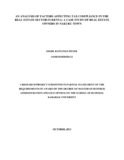AN ANALYSIS OF FACTORS AFFECTING TAX COMPLIANCE IN THE REAL ESTATE SECTOR IN KENYA: A CASE STUDY OF REAL ESTATE OWNERS IN NAKURU TOWN
Abstract
The main issue faced by all tax authorities is that it has never been easy to persuade all taxpayers
to comply with the regulations of a tax system. Real estate sector is one of the fastest growing
sectors of the economy in Kenya yet taxes collected from this sector have continually been on
decline for the last five years. The study specifically sought to determine the effect of tax
compliance cost, tax education and knowledge, fines and penalties and perceived opportunity for
tax evasion on tax compliance in the Real Estate sector. The study was guided by Theory of
Planned Behavior. The study used explanatory research design. A sample size of 271 was drawn
from the target population of 841 real estate investors. Data was collected using structured
questionnaire, coded, keyed and analyzed quantitatively using both descriptive and inferential
statistics. The study findings showed that compliance cost had the negative effect on level of tax
compliance. However, tax knowledge and education had positive effect on level of tax
compliance among real estate investors. Similarly, fines/penalties had positive effect on level of
tax compliances, while perceived opportunity for tax evasion had negative effect. The study
provides some preliminary evidence that imposing fines/penalties and provision of tax
knowledge and education among real estate investors will improve tax compliance. Conversely,
high compliances cost and high opportunity for tax evasion will reduces tax compliance among
real estate investors. Thus, tax compliance cost should be in a way that does not encourage
taxpayers to evade tax. There should be stiff enforcement of fines and penalties to deter tax
evasion. Additionally, tax authorities should simplify processes involved in filling of returns and
payment of taxes.

